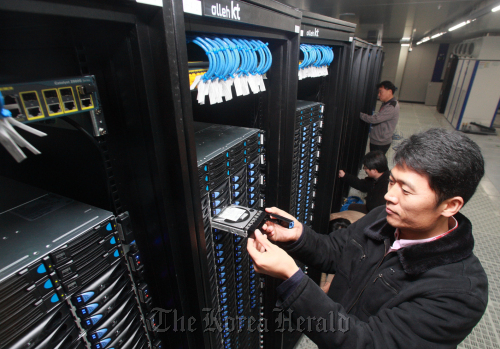Local carriers look to take share of global market expected to reach $44.2b in 2013
Korea’s telecom carriers are jumping on the cloud computing market to meet growing demand for software, platform and data storage in service.
SK Telecom Co., Korea’s top wireless carrier, said Monday it will open a cloud service center that will allow small and mid-sized firms to use high-capacity computing resources without additional facility investment.
The Cloud Data Center hosts about 1,500 virtual servers to facilitate sharing of resources, software and data for businesses using desktop computers, laptops, tablet PCs and smartphones.
In November, SK established an infrastructure that includes data storage, networking, management solutions and security services for cloud computing at the Internet Data Center in Ilsan, Gyeonggi Province, run by its affiliate SK Broadband, and test-run for two months.
The carrier began cloud computing services in June by introducing “T bizpoint” office pack. Its “T cloud biz,” launched in December, provides one-stop business support tools for SMEs to promote a more effective working environment.
“This year marks a period in which the cloud market fires up on a full scale,” said Park In-sik, executive vice president of the company’s enterprise business division.
“SK Telecom will lead the market by offering distinct cloud computing experiences through specialized solutions and services that meet customers’ needs, and by creating an eco-system through mutual collaboration with small- and mid-sized service enterprises.”
 |
Workers check server computers at a data center in Seoul. (The Korea Herald) |
At the center, SK plans to provide small-scale businesses with location-based services for marketing analysis and machine-to-machine solutions that allow both wireless and wired systems to communicate with other devices of the same ability.
It will also expand support and partnerships with them to encourage them to develop various core and applied cloud technologies, thus pioneer the market later on.
The launch of the CDC means the inauguration of SK’s full-scale clouding service business and reflects its effort to secure a predominant position in the burgeoning industry.
Other two telecom carriers ―― KT Corp. and LG Uplus ―― also announced their plans last year to jump into competition.
KT, the nation’s largest fixed-line operator, introduced an enterprise-level cloud services in August that lend online storage, servers and solutions.
The “ucloud pro” could help subscriber firms cut their information and technology expenditures up to 90 percent, KT said. More than 500 firms have registered so far.
The operator announced in August it would invest 120 billion won ($108 million) by 2011 for the advancement of cloud computing services.
In December, KT announced a plan to acquire local computing platform technology firm NexR early this year and work with solutions developer Citrix and Microsoft to strengthen its competitiveness in the sector.
It said in October that it looks to provide a standardized global platform for cloud computing to small and mid-sized firms to jointly enter the overseas market.
The company also aims to launch a virtual desktop infrastructure in the first quarter of the year for Apple’s iPad and desktop computers.
LG Uplus’ “U+ Box” gives users access to their uploaded photos, music and video clips on their smartphones, PCs, tablets and Internet protocol TVs by connecting its wireless Internet and 3G network.
It also offers free storage space of up to 1 gigabyte, and regular security updates and backup programs to prevent any data loss or security leaks.
“U+ Box not only serves as a storage cloud but also as a Web hub which connects all Internet-accessible devices and our service,” an LG official said.
The country’s smallest mobile carrier formed a strategic alliance with Microsoft Corp. in July to develop cloud computing services for SMEs in Korea.
According to the Internet Data Center, global spending on the new technology is expected to jump more than 150 percent to $44.2 billion in 2013 from $17.4 billion in 2009.
It is also projected to take up a 25-percent stake in the IT market by 2012, compared with 9 percent in 2008.
In 2009, the government unveiled a comprehensive package to promote the cloud computing technologies by injecting up to 614.6 billion won by 2014.
Major industry leaders such as Samsung SDS, LG CNS, KT and SK Telecom have been testing the technology for personal and business-level services over the past couple years.
By Shin Hyon-hee (
heeshin@heraldcorp.com)








![[Today’s K-pop] Blackpink’s Jennie, Lisa invited to Coachella as solo acts](http://res.heraldm.com/phpwas/restmb_idxmake.php?idx=644&simg=/content/image/2024/11/21/20241121050099_0.jpg)